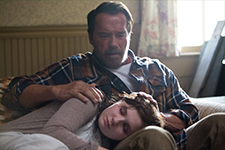Maggie
|  The dour, postapocalyptic drama Maggie is about the most unlikely Arnold Schwarzenegger vehicle since ... well, pretty much ever. Since his return to regular acting gigs five years ago, Schwarzenegger has favored the familiar, dependable terrain of routine action bombast, even if said action movies—including all three installments of the Expendables franchise (2010–2014), The Last Stand (2013), and Sabotage (2014)—have wisely foregrounded his age, thus distinguishing them from his 1980s and early ’90s starpower heyday. The dour, postapocalyptic drama Maggie is about the most unlikely Arnold Schwarzenegger vehicle since ... well, pretty much ever. Since his return to regular acting gigs five years ago, Schwarzenegger has favored the familiar, dependable terrain of routine action bombast, even if said action movies—including all three installments of the Expendables franchise (2010–2014), The Last Stand (2013), and Sabotage (2014)—have wisely foregrounded his age, thus distinguishing them from his 1980s and early ’90s starpower heyday.Maggie, on the other hand, is something else entirely, and it is perhaps the first Schwarzenegger film in which he plays something resembling an absolutely ordinary human being. He still has his hulking size and familiar Austrian accent, but with a full beard, slicked hair, and slouched shoulders suggesting a weariness that is both physical and spiritual, he transforms in a way we haven’t ever seen. This is not Schwarzenegger the machine, or Schwarzenegger the hardbody, or Schwarzenegger the fantasy savior icon, but rather Schwarzenegger brought down to earth, made vulnerable, and it works. Via snippets of radio, the film establishes at the very beginning that the world has fallen prey to some kind of virus that turns people in ravenous zombies, although it takes an agonizing six weeks, during which their veins grow black, their skin white, their eyes milky, and their sense of smell heightened and increasingly attuned to human flesh. What remains of society has buckled down into a kind of rigorous police state in which those who shows signs of advanced infection must be quarantined, which sounds much better than it is. The cities, of course, have become the most dangerous places, and much of Maggie unfolds in the open rural stretches of the Midwest, where it is easier to imagine that the whole world isn’t crumbling. You wouldn’t think there would be anything left to do or say in the postapocalyptic zombie genre, especially in the era of The Walking Dead, so it’s not surprising that Maggie doesn’t chart any new terrain, dramatically or otherwise, that hasn’t been mined again and again since George A. Romero’s Night of the Living Dead (1968). However, first-time screenwriter John Scott 3 and visual effects technician-turned-director Henry Hobson do an admirable job of making their world both palpably real and not the focus of attention. For a zombie movie, the zombies stay almost entirely at the margins, both visually and narratively, which allows us to focus on the characters and their plights. There is little gore, and when zombies are dispatched, it is done off-screen. The thrust of the story is Schwarzenegger’s character, Wade, a farmer from central Kansas, who wants to protect his teenage daughter Maggie (Abigail Breslin), who has been bitten and infected. Because the transformation is gradual, they have a significant amount of time together, although the end is obvious and, for all intents and purposes, unavoidable. So, the film’s drama doesn’t revolve so much around a frantic attempt to save her life or find a cure, but rather around the characters quietly grappling with the inevitable. Wade is a man of few words and great resolve, but in this case his resolve is futile to the point of being tragic, which gives the character a sense of great poignancy that Schwarzenegger plays surprisingly well (part of his motivation is a promise to Maggie’s deceased mother to always protect her). Maggie’s stepmother, Caroline (Joely Richardson), tries to be supportive, as well, but it is obvious that she doesn’t have the same tenacity (or stubbornness … or willful delusion). For her part, Maggie seems to be resigned to her fate, which gives her a certain level of personal freedom that is nevertheless overshadowed by the fact that she is slowly becoming a ravenous creature that will hurt anyone around her, including those she loves. At one point she cuts off one of her own fingers when it begins to rot, a desperate attempt to reclaim some control over her body. With a simple, haunting score by David Gordon Green regular David Wingo and dark, jittery cinematography Lukas Ettlin (The Texas Chainsaw Massacre: The Beginning, Black Sails), Maggie is a far cry from typical Schwarzenegger fare, and its refusal to dive into horror scare clichés and gruesome violence also distinguishes it from the majority of zombie movies, which tend to lean toward the visceral and the grotesque. Some will no doubt find the proceedings a little too slow and grinding, especially since the film is essentially a drama about a terminal illness in which everyone is resigned to the impending death and therefore trapped in an agonizing, impotent waiting game. Hobson’s admirable restraint behind the camera and the fine performances by all involved give the material its sense of emotional depth, and even those who might resist the idea of the film on paper—either because of Schwarzenegger’s involvement or a general disdain for horror movies—might very well be surprised by how emotionally gripping it becomes, especially in the second half when each moment could be the last. Copyright ©2015 James Kendrick Thoughts? E-mail James Kendrick All images copyright © Lionsgate and Roadside Attractions |
Overall Rating: 

 (3)
(3)


